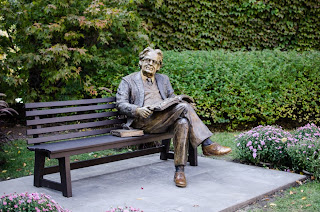In spite of (or perhaps because of) receiving two
literature degrees myself, I continued in such a mindset until recently. I’m
happy to say that, today, I have a maturing perspective on literature, and I’m
much indebted to a great Canadian scholar for bringing me to this point.
Northrop Frye (1912-1991) was a professor at the University of Toronto, and to
this day he is considered one of the most important authorities on literature.
In my tour of all things Canadian, I picked up his book “The Educated
Imagination.” I read much and understood little, so I’m hoping that this entry
will help me to process the main ideas.
I want to tentatively suggest that there are two main
concepts in Frye’s book. First, we use our imaginations way more than we give
credit. We live in two worlds: the day-to-day world of ordinary experience, and
the world of potential. In the first world, we use the ordinary language of
practical sense. We go to the bank, buy groceries, and interact with coworkers.
In the second world, we speak the language of imagination. Not everyone is a
poet, but most of us can identify with this thought: “I see the world as it is,
and I can imagine things differently.” When artists write, the imagination either
looks up to a world better than our own (think of the happy endings in Cinderella and Pride and Prejudice), or it looks down to a world worse than our
own (think of Resident Evil and Hamlet). In Frye’s words, “Literature
gives us an experience that stretches us vertically to the heights and depths
of what the human mind can conceive” (61).
So the first point is that all of us use our imagination
all the time, and artists have the gift of crafting it into words. The second point is that we need our imagination, not only because it’s
part of what makes us human, but also because it strengthens the values we need
to strive for something better than the world around us. Think of The Avengers when Ironman sacrificed his
life to destroy the bomb. Think of the soldier’s compassion and bravery in Saving Private Ryan. Think of the beauty
of friendship in The Lord of the Rings.
And when you walked out of Avatar, you
wanted to hug a tree, didn’t you?
I think what Frye wants us to see is that literature puts
us in touch with our humanity. It operates in the human world of love and death,
joy and pity, bravery and jealousy. When we read great works of literature, we
can see part of who we are, and we look beyond ourselves into other possibilities
of human experience. Among other virtues, reading widely and deeply must lead
to tolerance – a great Canadian value if ever there was one.

No comments:
Post a Comment